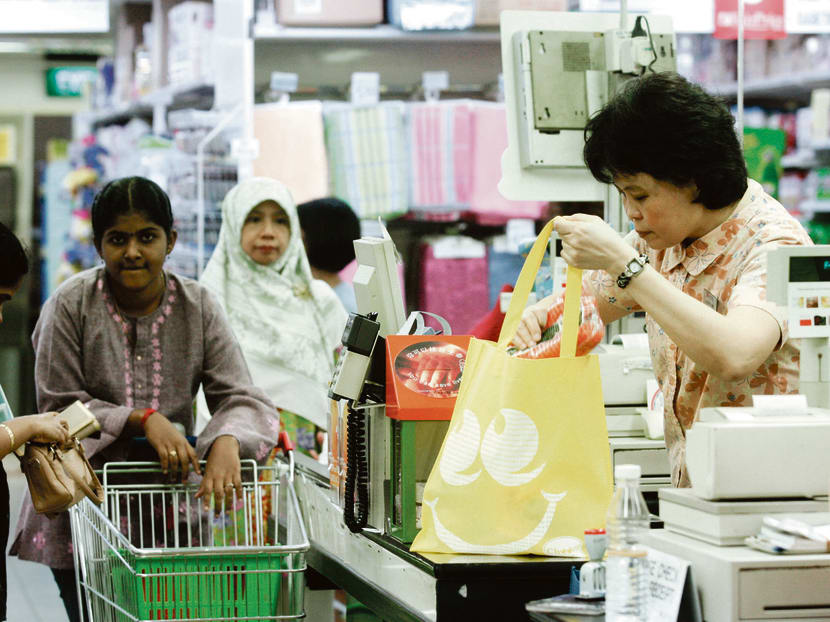Lukewarm response from retailers to support BYO campaign
SINGAPORE — Over the last five months, non-governmental organisation Zero Waste SG tried to draw some 200 retailers to be a part of the Bring Your Own (BYO) Singapore campaign. In the end, only 14 came on board.

Many retailers did not want to take part in the campaign because they were afraid offering incentives to motivate consumers to use fewer plastic products might end up raising their operating costs, said Mr Eugene Tay, executive director of Zero Waste SG.
SINGAPORE — Over the last five months, non-governmental organisation Zero Waste SG tried to draw some 200 retailers to be a part of the Bring Your Own (BYO) Singapore campaign. In the end, only 14 came on board.
They are to be involved in the nationwide movement to help Singaporeans use less plastic, whether it be plastic bags or food containers.
Speaking to reporters on Thursday (Aug 31), Mr Eugene Tay, executive director of Zero Waste SG, said that the organisation was “definitely not satisfied” with the numbers.
"The big retailers have to step up their efforts in not just educating consumers to (cut down the use of) disposables, but also in leading the way to show (the) small and medium enterprises that the big players are ready to (do this),” he added.
While some of the 200 or so retailers approached had not made up their minds, Mr Tay revealed that others did not want to take part because they were afraid that offering incentives to motivate consumers to use fewer plastic products might end up raising their operating costs.
Mr Tay explained that by cutting back on disposables, retailers save on some material costs. The hope is for the campaign to drive more traffic to the shops, making up the shortfall that comes from offering rewards to the customers.
Then, the retailers were also concerned about the varying sizes of reusable receptacles customers may use. There might be complaints from customers that “they are receiving less”, they said.
Two eateries, Indian restaurant chain Muthu’s Curry and Percolate cafe, which were not among the retailers approached by Zero Waste SG, told TODAY that they explored or started a similar initiative.
Last year, Muthu’s Curry considered giving discounts to encourage patrons to use their own take-away containers. However, rising rental rates and food costs were among the barriers to making it work.
The chain also could not reach out to customers in “large numbers” to promote such a move, Mr Srinivasan Ayyakannu, 39, its operations director, said.
Earlier in August, Percolate cafe in Bedok North began shaving 50 cents off coffee bills for patrons who choose the reusable Sol Cups sold there. Co-founder Avin Tan, 30, said that the cafe was slightly concerned the incentive might trim margins for certain drinks that have costlier ingredients.
Other difficulties include patrons who ask to store the glass cups at the shop. Allowing other reusable mugs could also mean having to manage customer expectations about “under-filling” the cups, so confining it to the “cafe-standard” Sol Cups negates this problem, he added.
However, Mr Wiltian Ang, 35, owner of The Matcha Project X Copper Espresso takeaway kiosk at Marina Boulevard, which is part of the BYO Singapore campaign, said that it would not incur extra costs with the discount it is offering.
“We just earn less … there’s more than enough margin to cover (the cost of the incentive),” he said.
Eatery Aloha Poke’s co-founder John Chen, 38, said that giving an extra serving of a food item (worth S$1) for every reusable container presented is a “very small contribution to help save the environment”.
BYO movements have been around for years. The Singapore Environment Council (SEC) and the National Environment Agency ran the Bring Your Own Bag Day campaign between 2007 and 2010, involving about 300 retailers.
In 2013, furniture giant Ikea stopped making available disposable plastic bags.
Over the years, the SEC has also taken steps to nudge consumers to use their own bags when shopping. Since July, for instance, it has joined hands with green group Plastic-Lite SG to send volunteers to supermarkets, where patrons are given reusable bags and educated on how to cut waste at home.








